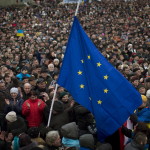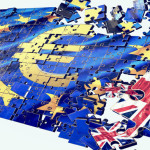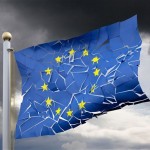On 25th March the heads of state and government of all EU member states are meeting in Rome to commemorate the sixty years since the signing of the Treaties of Rome. The top leaders of the European institutions will be present as well. Men and women, representatives of European movements, youth and seniors will join them and march through the streets of Rome to push their representatives to be bolder in pursuing the path towards the political unity of Europe. On the eve of the anniversary, at 19, in the Basilica of the Twelve Holy Apostles, Christians of all denominations and all people of good will meet for an ecumenical prayer vigil.
To the solemn memorial service, which we hope will be sober and meaningful and not just protocol, a march and a prayer will therefore be added: the march to remember the way done so far and to indicate the future objectives that Europe must achieve, a prayer as a moment of pause to resume vigour, restore strength, quench one’s thirst at the source of the spiritual values which are the foundation of the common European home.
Sixty years ago, on the Capitoline hill, the treaties that established the European Economic Community (EEC) and European Atomic Energy Community (Euratom) were signed: another of those small steps that would lead first to the European Community and thereafter, to the current European Union. The countries which signed the agreements were six. Today there are twenty-seven. The first European Community – the CECA (European Coal and Steel Community) – was born seven years before, on May 9th when the French Foreign Minister Robert Schuman proposed to accepting countries not only “to put together the production of coal and steel”, but to adhere to a supranational community, the starting point for an unprecedented political system never seen in history. Indeed, between 1950 and 1957, the six countries also joined the CED (European Defence Community), the first seed that would give rise to a common European army, and, consequently, to a common foreign policy, but the non-ratification by the French National Assembly of the Accession Treaty, made the project fail. It seemed the end of the European dream. It was the first defeat suffered by the united Europe about to be born. Even then there were the Cassandras in favour of sovereign states that celebrated the death of Europe.
But Europe was not dead. It could not die because the men of those times were coming out of the barbarism of a world war and were looking for a common country that established itself as necessary to fight the fanaticism of man against man, of the nationalism of a nation against another, of the hatred of the winner against the defeated.
History seems to repeat itself. While Rome recalls the customs union as a crucial prerequisite to start economic integration and to harmonize economic and social policies, some countries are only looking at their own private backyard as a solution to the challenges of globalization. And if, on May 9th 1950, the defeated countries did not fold on themselves, closing on their defeat, but found the courage to walk together with the winners and these took no arrogance, but the common good to work together with the enemies of a time, today nations are tearing one other apart to accommodate men, women and children fleeing war and poverty. If at the basis of the European construction there was the reconciliation between France and Germany, today the reconciliation changes name and is called “understanding”, that is the ability to “cum-taking,” to take “with you” the needs and necessities, the demand for help of entire human masses.
“All the destructive ideas that were handed down to us in the past must be replaced by the feeling of solidarity, that is, the belief that the real interest of each country consists in recognizing and accepting in practice the interdependence of all. Selfishness never pays”: so writes Robert Schuman in his book-will, an Italian edition of which, accompanied by notes and commentaries, is about to be published by AVE.
The Europe of the Treaties, which will be remembered next March 25th is certainly the Europe of the constitutional state and the rule of law, but it is not yet the Europe dreamed of by Dante, Erasmus, Comenius, Hugo, Briand, by the founding fathers. We need a Europe which exceeds the scope, that is that Europe of spirit that exceeds the law. A Europe that looks at the future and is able to renew itself day by day in a relentless work of deconstruction and reconstruction.
Who looks at Europe with skepticism, with hypercriticism, cynically and sometimes with ignorance, go and patch up the cracks because the risk of living in solitude which condemns the modern man to despair, can also lead to the failure of everybody’s history. Today it is necessary to color Europe with our hopes.
Il 25 marzo prossimo converranno a Roma i capi di Stato e di Governo di tutti i Paesi membri dell’Ue per ricordare i sessant’anni dalla firma dei Trattati di Roma. Saranno pure presenti i massimi dirigenti delle istituzioni europee. A essi si uniranno uomini e donne, rappresentanti di movimenti europeistici, giovani e anziani che marceranno per le strade di Roma per spingere i loro rappresentanti a essere più audaci nel proseguire il cammino verso l’unità politica dell’Europa. La vigilia dell’anniversario, alle 19, nella basilica dei Santi XII Apostoli, i cristiani di tutte le confessioni e gli uomini di buona volontà si troveranno assieme per una veglia ecumenica di preghiera.
Alla solenne cerimonia commemorativa, che ci auguriamo sia sobria e ricca di significato e non solo protocollare, si aggiungeranno perciò una marcia e una preghiera: la marcia per ricordare il cammino finora svolto e per indicare i futuri traguardi ai quali l’Europa deve giungere, la preghiera come momento di sosta per riprendere il vigore, ritemprare le forze, dissetarsi alla fonte dei valori spirituali che sono a fondamento della comune casa europea.
Sessant’anni fa, sul colle del Campidoglio, si firmarono i Trattati che istituirono la Comunità Economica Europea (CEE) e la Comunità Europea dell’Energia Atomica (CEEA): un altro di quei piccoli passi che avrebbero portato dapprima alla Comunità Europea e, successivamente, all’attuale Unione Europea. I Paesi che allora firmarono gli accordi erano sei. Oggi sono ventisette. La prima comunità europea – la CECA (Comunità Europea del Carbone e dell’Acciaio) – era nata sette anni prima, il 9 maggio, quando il ministro francese degli Affari esteri Robert Schuman propose ai Paesi che vi avessero aderito non solo di “mettere assieme la produzione del carbone e dell’acciaio”, ma di aderire a una comunità sovranazionale, punto di partenza per un sistema politico senza precedenti, mai visto nella storia. In verità, tra il 1950 e il 1957, i sei Paesi aderirono anche alla CED (Comunità Europea di Difesa), il primo seme che avrebbe dato luogo a un esercito comune europeo e, conseguentemente, a una politica estera comune, ma la mancata ratifica da parte dell’Assemblea nazionale francese del trattato d’adesione fece fallire il progetto. Sembrò la fine del sogno europeo. Fu la prima sconfitta che subì l’Europa unita che stava per nascere. Anche allora ci furono le Cassandre sovraniste che festeggiarono la morte dell’Europa.
Ma l’Europa non era morta. Non poteva morire perché gli uomini di quei tempi uscivano dalla barbarie di una guerra mondiale ed erano alla ricerca di una patria comune che s’imponesse come necessaria per combattere il fanatismo dell’uomo contro l’uomo, del nazionalismo di una nazione contro l’altra, dell’odio del vincitore contro il vinto.
La storia sembra ripetersi. Mentre a Roma si ricorda l’unione doganale, come premessa indispensabile per avviare l’integrazione economica e per armonizzare politiche economiche e sociali, in alcuni Paesi oggi si guarda solo al proprio orticello privato come soluzione alle sfide della globalizzazione. E se, il 9 maggio 1950, i paesi vinti non si ripiegarono su se stessi, chiudendosi nella propria sconfitta, ma trovando il coraggio di camminare assieme ai vincitori e questi assunsero non l’arroganza, ma il bene comune per lavorare assieme ai nemici di un tempo, oggi ci si accapiglia per accogliere uomini, donne, bambini che fuggono dalla guerra e dalla miseria. Se alla base della costruzione europea ci fu la conciliazione fra Francia e Germania, oggi la conciliazione cambia nome e si chiama “comprensione”, cioè capacità di “cum-prendere”, di “prendere con” sé i bisogni, le necessità, la richiesta di aiuto di masse intere d’umanità.
“A tutte le idee distruttrici che ci hanno tramandato nel passato, occorre sostituire il sentimento della solidarietà, cioè la convinzione che il vero interesse di ciascun paese consiste nel riconoscere e nell’accettare in pratica l’interdipendenza di tutti. L’egoismo non paga mai”. Così scrive Robert Schuman nel suo libro-testamento, di cui un’edizione italiana, accompagnata da note e commenti, sta per essere pubblicata dall’editrice AVE.
L’Europa dei Trattati, che ricorderemo il prossimo 25 marzo, è certamente l’Europa dello Stato costituzionale e dello Stato di diritto, ma non è ancora l’Europa sognata da Dante, da Erasmo, da Comenio, da Hugo, da Briand, dai padri fondatori. Abbiamo bisogno di un’Europa che superi gli accordi, ossia di quell’Europa dello spirito che supera il diritto. Di un’Europa che guardi al futuro e sia capace di rinnovarsi di giorno in giorno in un lavoro incessante di decostruzione e di ricostruzione.
Chi guarda all’Europa con scetticismo, con ipercriticismo, con cinismo e talvolta con ignoranza si metta a ricucire le fratture perché il rischio di vivere in solitudine, come condanna l’uomo moderno alla disperazione, così può portare al fallimento della storia di tutti. Oggi occorre colorare di speranze la nostra Europa.
Edoardo Zin
Latest posts by Edoardo Zin (see all)
- 60° Treaties of Rome: a Europe that struggles and hopes - 19 marzo 2017
- Europe lacks the great politics - 28 dicembre 2016
- The strength of Robert Schuman - 30 aprile 2016











